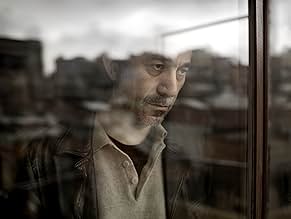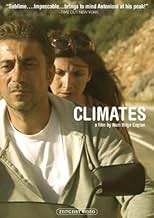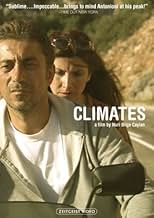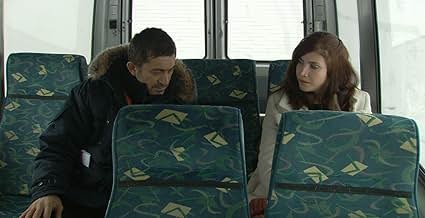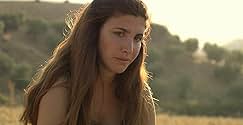NOTE IMDb
7,1/10
15 k
MA NOTE
Ajouter une intrigue dans votre langueDowdy university instructor Isa is an inattentive husband to his younger, TV-business wife Bahar. Self-absorbed, Isa only communicates in the most rudimentary way, while she, similarly, deta... Tout lireDowdy university instructor Isa is an inattentive husband to his younger, TV-business wife Bahar. Self-absorbed, Isa only communicates in the most rudimentary way, while she, similarly, detaches into crying jags and juvenile behavior.Dowdy university instructor Isa is an inattentive husband to his younger, TV-business wife Bahar. Self-absorbed, Isa only communicates in the most rudimentary way, while she, similarly, detaches into crying jags and juvenile behavior.
- Réalisation
- Scénario
- Casting principal
- Récompenses
- 12 victoires et 12 nominations au total
Nazan Kesal
- Serap
- (as Nazan Kirilmis)
Emin Ceylan
- Isa'nin Babasi
- (as M. Emin Ceylan)
Apo Demirkubuz
- Dizi Oyuncusu
- (as Abdullah Demirkubuz)
Avis à la une
Ceylan's previous feature, Distant, won the Grand Prix at the 2003 Cannes Film Festival; its glowing reception cemented his status as a major contemporary auteur. In Climates, Ceylan takes us to stunning locations all across Turkey in what may be his most personal film to date - in addition to directing and starring, he also wrote and edited. Filmed with his signature contemplative style, it is a highly subdued, deliberately-paced work that conveys more through silence than through exposition. The cinematography by Gökhan Tiryaki achieves a new high for high-definition video with its refined, poetic images, while Ceylan's precise, beautiful compositions give the film a characteristically elegiac tone. This achingly poignant film subtly captures the emotional tremors that ripple through a fallow relationship.
We have recently heard about too much about Iklimler. There were mix of comments about the movie and Nuri Bilge Ceylan. Half of them were negative, half of them were positive. There must be confusion in evaluating his movies. Then I went to the movie to see by myself.
At first sight Iklimler has absent story. The movie began from uncertain situation and goes on through uncertain path. Writer and director should have been separated with each other in order to give double power to the movie. Nuri Bilge Ceylan can be successful director, but he is not a writer as good as his directing talent.
Nuri Bilge Ceylan wanted to show us how to make a movie with simple story even no story. The players are ordinary, music's are ordinary, but the movie itself is really artistic. He was focusing to the eyes effectively and eyes showed us emotions powerfully.
Natural voices were used in the movie and this technique should have been very difficult if we take into consideration open field's scenery. The conditions are not totally controllable in this kind of areas. This voice preference shows us Nuri Bilge's self confidence.
We can not criticize players well because they were seen in backgrounds. The movie itself depended on artistic scenes too much, not on players. Even though Nazan Kirilmis and Ebru Ceylan were good enough. Nuri Bilge himself is not talented as his directing skill. Nuri Bilge was known with misery. But after his playing it seems he will lose this misery. Other players were too naive and not suitable for the movie.
Panoramas were excellent. From the beginning Antalya-Kas, goes on with Istanbul-Beyoglu and finally Agri- Ishak Pahsa Palace. The winter season reflected with a hundred percent reality and beauty.
When we look at the overall Nuri Bilge made ego satisfaction in all writing, directing and playing dimensions. In directing dimension it is true that he is probably the best director in Turkey. Other dimensions were not sufficient to make the movie perfect. However, Nuri Bilge Ceylan did well with Iklimler for Turkish Cinema.
At first sight Iklimler has absent story. The movie began from uncertain situation and goes on through uncertain path. Writer and director should have been separated with each other in order to give double power to the movie. Nuri Bilge Ceylan can be successful director, but he is not a writer as good as his directing talent.
Nuri Bilge Ceylan wanted to show us how to make a movie with simple story even no story. The players are ordinary, music's are ordinary, but the movie itself is really artistic. He was focusing to the eyes effectively and eyes showed us emotions powerfully.
Natural voices were used in the movie and this technique should have been very difficult if we take into consideration open field's scenery. The conditions are not totally controllable in this kind of areas. This voice preference shows us Nuri Bilge's self confidence.
We can not criticize players well because they were seen in backgrounds. The movie itself depended on artistic scenes too much, not on players. Even though Nazan Kirilmis and Ebru Ceylan were good enough. Nuri Bilge himself is not talented as his directing skill. Nuri Bilge was known with misery. But after his playing it seems he will lose this misery. Other players were too naive and not suitable for the movie.
Panoramas were excellent. From the beginning Antalya-Kas, goes on with Istanbul-Beyoglu and finally Agri- Ishak Pahsa Palace. The winter season reflected with a hundred percent reality and beauty.
When we look at the overall Nuri Bilge made ego satisfaction in all writing, directing and playing dimensions. In directing dimension it is true that he is probably the best director in Turkey. Other dimensions were not sufficient to make the movie perfect. However, Nuri Bilge Ceylan did well with Iklimler for Turkish Cinema.
Nuri Bilge Ceylan's enigmatically titled film, 'Climates', is quiet, stark, intimate and in places, quite beautifully shot. The story of the breakdown of a relationship, it depicts lives characterised by selfishness, emotional reticence and harshly physical sexual encounters. In spite of these strengths, the film also has weaknesses: the central character, played by the director himself, seems utterly undeserving of our sympathy (beyond the fact of his inner loneliness); and it's always hard to make a film about emotional emptiness without the film itself feeling, in places, slow and empty. This is particularly true of the film's opening, which makes no concessions to the fact that the audience doesn't yet know the characters well enough to be sufficiently interested in the painful detail of their lives. But the end, it has grown to present a certain emotional power of its own. It's always rewarding to see something other than a Hollywood version of the nature of human interaction; but at times, the film wanders, lost like its protagonists.
As in KASABA, Nuri Bilge Ceylan's first major feature, İKLİMLER (CLIMATES) is structured around the seasons. The action begins during the height of summer at the seaside resort of Kaş, where İsa (Nuri Bilge Ceylan) and his partner Bahar (Ebru Ceylan) agree to separate, as they believe they have nothing to give to their relationship. The action shifts to autumn in İstanbul, where it rains perpetually and İsa tries to continue his career as a university educator while having occasional flings with Serap (Nazan Kırılmış). The film's third act shifts to the eastern Turkish city of Doğubeyazit, where Bahar works on a television program; despite the twin disadvantages of blizzards and high winds, İsa tries his best to patch up his relationship with Bahar.
The natural settings (or "climates") of the film comment on the state of İsa's mind. Despite cloudless skies and a calm sea (suggesting openness and/or happiness) İsa's mood remains perpetually melancholy; unable to communicate his feelings or establish any contact - either emotional or physical - with Bahar, he is imprisoned by pride. The rains of İstanbul that plash on the windows sum up his perpetual unhappiness, as he vainly searches for a new relationship. The winter snows of Doğubeyazit have a similar function as the snows in UZAK; they symbolize İsa's frozen soul as he tries and fails to improve his existence.
İKLİMLER revisits the themes now characteristic of Ceylan's work: the inability of individuals to communicate with one another, the ways in which words are used to obscure rather than facilitate meaning. The script is a sparse one; for much of the time we see the characters looking to the left and the right of the camera without speaking. We would love to know what they think, but Ceylan will not give us that privilege. When the characters do speak - for example, when İsa promises to change if Bahar returns to him, they do so in clichés.
Yet the overall tone of İKLİMLER is a little more bitter as compared to UZAK, for instance. There is a long and savage sex scene between İsa and Serap, where the protagonists seem almost animal-like with their guttural grunts and gasps for breath. İsa seems hell-bent on dominating Serap through sheer force, as he pins her to the ground and forces himself on to her. If words have no meaning, it seems, then human beings behave like beasts. In light of such knowledge, we understand that İsa's personality will never change, despite his protestations to the contrary.
İKLİMLER once again makes pertinent comments about the media, and the ways in which people use it to shy away from rather than confront experience. İsa is shown taking photographs of ancient sites; for him it's the technology that matters, not the experience of communing with the ghosts of the people who once lived there. Likewise Bahar works as an art director on a television series, where all emotions are false and/or contrived, dependent on a director's whim rather than on human feelings. There is one sequence where a young couple (Ceren Olcay, Abdullah Demirkubuz) are shown re-enacting a sequence beside a grave for the cameras, that forms a pertinent contrast to İsa and Bahar's relationship.
The film employs the narrative style now characteristic of Ceylan's work, with viewers encouraged to focus on aspects of the mise-en- scene rather than simply following the story. Lengthy shots are interspersed with close-ups and two-shots, while the use of repeated shots (for example, close-ups of characters smoking cigarettes) are employed to suggest sterility within the protagonists' lives.
Perhaps İKLİMLER lacks the sheer visual bravado of a film like UZAK, but it is a powerful experience to watch all the same.
The natural settings (or "climates") of the film comment on the state of İsa's mind. Despite cloudless skies and a calm sea (suggesting openness and/or happiness) İsa's mood remains perpetually melancholy; unable to communicate his feelings or establish any contact - either emotional or physical - with Bahar, he is imprisoned by pride. The rains of İstanbul that plash on the windows sum up his perpetual unhappiness, as he vainly searches for a new relationship. The winter snows of Doğubeyazit have a similar function as the snows in UZAK; they symbolize İsa's frozen soul as he tries and fails to improve his existence.
İKLİMLER revisits the themes now characteristic of Ceylan's work: the inability of individuals to communicate with one another, the ways in which words are used to obscure rather than facilitate meaning. The script is a sparse one; for much of the time we see the characters looking to the left and the right of the camera without speaking. We would love to know what they think, but Ceylan will not give us that privilege. When the characters do speak - for example, when İsa promises to change if Bahar returns to him, they do so in clichés.
Yet the overall tone of İKLİMLER is a little more bitter as compared to UZAK, for instance. There is a long and savage sex scene between İsa and Serap, where the protagonists seem almost animal-like with their guttural grunts and gasps for breath. İsa seems hell-bent on dominating Serap through sheer force, as he pins her to the ground and forces himself on to her. If words have no meaning, it seems, then human beings behave like beasts. In light of such knowledge, we understand that İsa's personality will never change, despite his protestations to the contrary.
İKLİMLER once again makes pertinent comments about the media, and the ways in which people use it to shy away from rather than confront experience. İsa is shown taking photographs of ancient sites; for him it's the technology that matters, not the experience of communing with the ghosts of the people who once lived there. Likewise Bahar works as an art director on a television series, where all emotions are false and/or contrived, dependent on a director's whim rather than on human feelings. There is one sequence where a young couple (Ceren Olcay, Abdullah Demirkubuz) are shown re-enacting a sequence beside a grave for the cameras, that forms a pertinent contrast to İsa and Bahar's relationship.
The film employs the narrative style now characteristic of Ceylan's work, with viewers encouraged to focus on aspects of the mise-en- scene rather than simply following the story. Lengthy shots are interspersed with close-ups and two-shots, while the use of repeated shots (for example, close-ups of characters smoking cigarettes) are employed to suggest sterility within the protagonists' lives.
Perhaps İKLİMLER lacks the sheer visual bravado of a film like UZAK, but it is a powerful experience to watch all the same.
This film was really impressive (I agree with everything localdj2001 said), and much better than I expected. I saw it at the Melbourne Film Festival to a capacity audience.
Some people cannot enjoy a film if they cannot feel for the characters. If so, this is not the film for you. The characters are all flawed, and not particularly likable (kudos to the director/actor for allowing himself and his wife to be portrayed in this manner).
We have a reasonable size established Turkish community in Melbourne. This film introduced me to a more modern view of the Turkish that we don't see here. Culturally, it was very interesting.
The film reeks with emotional honesty. It is mature, adult cinema. The story is somewhat cryptic as there are aspects of a collapsing relationship that are never revealed. But unfolding events reveal that everything is not what it seems. And real life is like this - we see something and think we know, but we only know the little glimpse we have seen.
What is said in this film is sparse but interesting. And what is not said is just as interesting. There are very long takes, some of which nothing much seems to happen. In others, there is much happening.
The title is very clever because it adds weight to the background of the film, which is the changing seasons. The cinematography was really stunning, especially at the end. Lighting was terrific. The film lingers long after the credits.
This is the first film I have seen by this director, but he is surely very accomplished. If very high quality, intelligent, artful European cinema is your taste, go see this.
Some people cannot enjoy a film if they cannot feel for the characters. If so, this is not the film for you. The characters are all flawed, and not particularly likable (kudos to the director/actor for allowing himself and his wife to be portrayed in this manner).
We have a reasonable size established Turkish community in Melbourne. This film introduced me to a more modern view of the Turkish that we don't see here. Culturally, it was very interesting.
The film reeks with emotional honesty. It is mature, adult cinema. The story is somewhat cryptic as there are aspects of a collapsing relationship that are never revealed. But unfolding events reveal that everything is not what it seems. And real life is like this - we see something and think we know, but we only know the little glimpse we have seen.
What is said in this film is sparse but interesting. And what is not said is just as interesting. There are very long takes, some of which nothing much seems to happen. In others, there is much happening.
The title is very clever because it adds weight to the background of the film, which is the changing seasons. The cinematography was really stunning, especially at the end. Lighting was terrific. The film lingers long after the credits.
This is the first film I have seen by this director, but he is surely very accomplished. If very high quality, intelligent, artful European cinema is your taste, go see this.
Le saviez-vous
- AnecdotesThis is the first and only movie of director Nuri Bilge Ceylan as an actor.
- Bandes originalesPiano Sonata in F minor, K. 466
Composed by Domenico Scarlatti
Meilleurs choix
Connectez-vous pour évaluer et suivre la liste de favoris afin de recevoir des recommandations personnalisées
- How long is Climates?Alimenté par Alexa
Détails
Box-office
- Montant brut aux États-Unis et au Canada
- 119 958 $US
- Week-end de sortie aux États-Unis et au Canada
- 9 665 $US
- 29 oct. 2006
- Montant brut mondial
- 1 385 085 $US
- Durée1 heure 38 minutes
- Couleur
- Mixage
- Rapport de forme
- 1.85 : 1
Contribuer à cette page
Suggérer une modification ou ajouter du contenu manquant

Lacune principale
By what name was Les climats (2006) officially released in India in English?
Répondre

